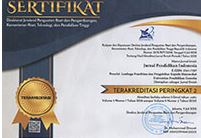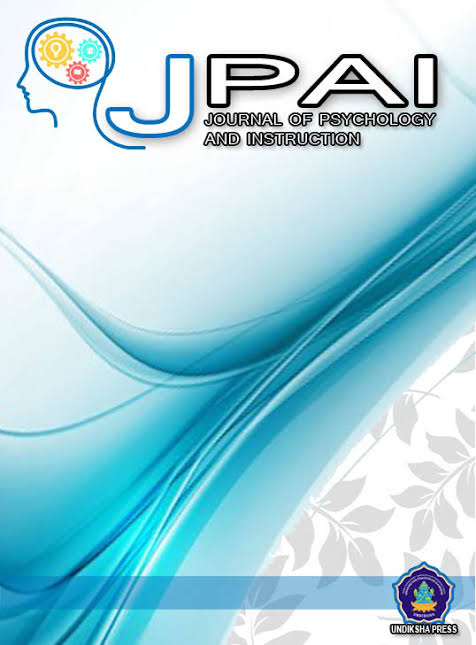Relaxation training to reduce the parenting stress of mother of preschool age children
DOI:
https://doi.org/10.23887/jpai.v4i2.25498Keywords:
Children, Preschool. Relaxation, Parenting stressAbstract
Parenting stress was experienced by all mothers, especially mothers who had preschool-age children. Parenting stress experienced by the mother would affect the confidence and perception of the mother towards care so that it affected the child's development and family stability. This research aimed to examine the effectiveness of relaxation training in reducing parenting stress of mothers for preschool-age children. Five mothers of preschool children participated in this research. The measuring instrument used was the parenting stress index, with a one-group pretest-posttest design research design. The results showed that relaxation training was significantly proven to reduce the stress of parenting in preschool children. The participants expressed that they felt more relaxed and calm so that they were able to manage emotions and find alternative solutions when facing problems that caused the emergence of parenting stress. Besides, physical tension felt to be more reduced.
References
Ahern, L. S. (2004). Psychometric Properties of The Parenting Stress Index-Short Form. Thesis. Religh: Departement of Psychology Collage of Humanities and Social Sciences, Faculty of North Carolina State University.
Berns, R. M. (2007). Child, family school, community: Socialization and support (7th ed). Belmont: Thomson Higher Education.
Conrad, A., & Roth, W. T. (2007). Muscle relaxation therapy for anxiety disorders: It works but how? Journal of Anxiety Disorders, 21(3), 243–264. doi: 10.1016/j.janxdis.2006.08.001. DOI: https://doi.org/10.1016/j.janxdis.2006.08.001
Davis, M., Eshelman, E. R., & McKay. (2008). The Relaxation and stress reduction workbook. Oakland: New Harbinger Publications.
Deater-Deckard, K. (2004). Parenting Stress. New Haven : Yale University Press. DOI: https://doi.org/10.12987/yale/9780300103939.001.0001
Fonseca, A., Nazare, B., & Canavarro, M. C. (2012). Parental psychological distress and quality of life after a prenatal or postnatal diagnosis of congenital anomaly: A controlled comparison study with parents of healthy infants. Disability and Health Journal, 5(2), 67–74. doi: 10.1016/j.dhjo.2011.11.001. DOI: https://doi.org/10.1016/j.dhjo.2011.11.001
Halme, N., Tarkka, M. T., Nummi, T., & Astedt-Kurki, P. (2006). The effect of parenting stress on fathers availability and engagement. Child Care in Practice, 12, 13−26. doi:10.1080/13575270500526220. DOI: https://doi.org/10.1080/13575270500526220
Hurlock. (2012). Perkembangan Anak, jilid 2. Jakarta: Erlangga.
Johnston, C., Hessl, D., Blasey, C., Eliez, S., Erba, H., Glaser, B., & Reiss, A. (2003). Factors associated with parenting stress in mothers of children with fragile X syndrome. Journal of Developmental and Behavioral Pediatrics, 24(4), 267-275. doi: 10.1097/00004703-200308000-00008. DOI: https://doi.org/10.1097/00004703-200308000-00008
Kaspereen, D. (2012). Relaxation intervention for stress reduction among teachers and staff. International Journal of Stress Management, 19(3), 238–250. doi:10.1037/a0029195. DOI: https://doi.org/10.1037/a0029195
Manzoni, G. M., Pagnini, F., Gorini, A., Preziosa, A., Castelnuovo, G., Molinari, E., & Riva, G. (2009). Can Relaxation Training Reduce Emotional Eating in Women with Obesity? An Exploratory Study with 3 Months of Follow-Up. Journal of the American Dietetic Association, 109(8), 1427–1432. doi: 10.1016/j.jada.2009.05.004. DOI: https://doi.org/10.1016/j.jada.2009.05.004
Opera, C., & Stan, A. (2012). Mothers of autistic children. How do they feel?. Procedia-Social and Behavioral Sciences, 46, 4191-4194. Retreived from https://www.ncbi.nlm.nih.gov/pmc/articles/PMC4827600/ DOI: https://doi.org/10.1016/j.sbspro.2012.06.224
Ostberg, M., & Hagekull, B. (2000). A Structural Modeling Approach to the Understanding of Parenting Stress. Journal of Clinical Child Psychology, 29(4), 615–625. doi: 10.1207/S15374424JCCP2904_13. DOI: https://doi.org/10.1207/S15374424JCCP2904_13
Ostberg, M., Hagekull, B., & Hagelin, E. (2007). Stability and Prediction of Parenting Stress. Infant and Child Development, 16, 207-223. doi:10.1002/icd.516. DOI: https://doi.org/10.1002/icd.516
Ramzan, N., & Minhas, K. (2014). Anxiety and Depression in Mothers of Disabled And Non-Disabled Children. Annals, 20(4), 313-320. Retrieved from https://pdfs.semanticscholar.org/1212/181e1b5a2424496cb4ebb1ca32aa0fb7e8d8.pdf
Semke, C. A., Garbacz, S. A., Kwon, K., Sheridan, S. M., & Woods, K. E. (2010). Family involvement for children with distruptive behaviors: The role of parenting stress and motivational beliefs. Journal of School Psychology, 48(4), 293-312. doi: 10.1016/j.jsp.2010.04.001. DOI: https://doi.org/10.1016/j.jsp.2010.04.001
Skreden, M., Skari, H., Malt, U., Pripp, A, Bjork, M., Faugli, A., & Emblem, R., (2012). Parenting stress and emotional wellbeing in mothers and fathers of preschool children. Scandinavian Journal of Public Health, 40, 596-604. doi:10.1177/1403494812460347. DOI: https://doi.org/10.1177/1403494812460347
Varvogli, L., Darvini, C. (2011). Stress Management techniques: Evidence-based Procedures That Reduce Stress and Promote health. Health Science Journal, 5(2), 74-89. Retreived from https://www.ncbi.nlm.nih.gov/pmc/articles/PMC5344985/
Wibawaniti, I. P. (2013). Efektifitas Media Edukatif Lembar Balik Pengasuhan Anak GPPH dalam Menurunkan Tingkat Stres Pengasuhan pada Ibu dengan Anak Gangguan Pemusatan Perhatian dan Hiperaktifitas (GPPH). Tesis. Yogyakarta: Universitas Islam Indonesia.
Yeo, K. J., & Teo, S. L. (2013). Child Behavior and Parenting Stress Between Employed Mothers and at Home Mothers of Preschool Children. Procedia - Social and Behavioral Sciences, 90, 895-903. Retreived from https://cyberleninka.org/article/n/888509 DOI: https://doi.org/10.1016/j.sbspro.2013.07.166










